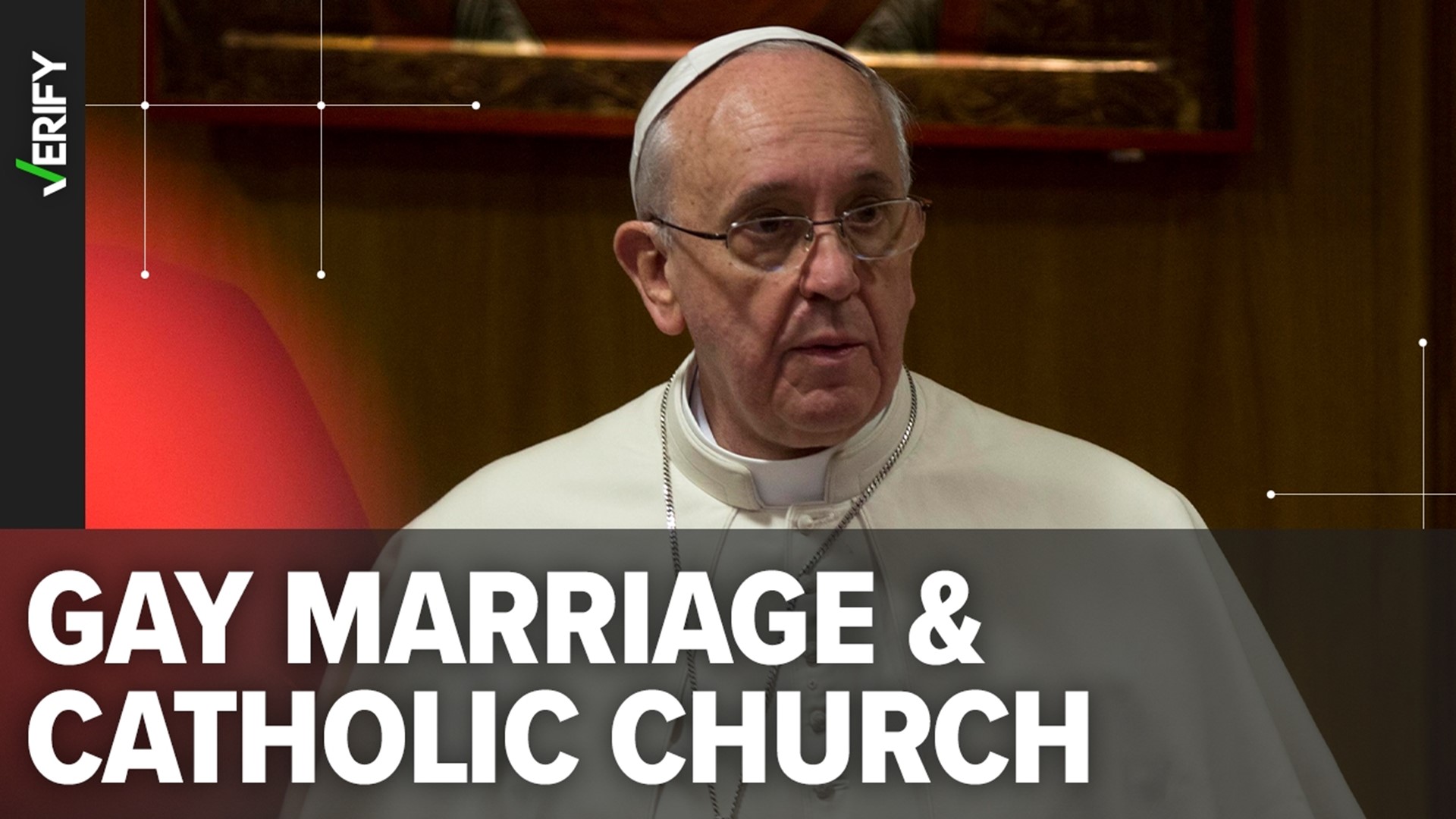On Dec. 18, Pope Francis formally approved allowing Catholic priests to bless same-sex couples. Some media outlets are calling the announcement a radical shift in policy aimed at making the Catholic Church, which has long shunned same-sex unions, more inclusive.
The pope’s announcement spurred an increase in searches about the Catholic Church’s stance on same-sex marriage, with people wondering if the move represents a change in the Church’s beliefs and rules about same-sex marriage.
THE QUESTION
Has the Catholic Church changed its stance on same-sex marriage?
THE SOURCES
- Vatican’s Dicastery for the Doctrine of the Faith
- United States Conference of Catholic Bishops
- Article by Rev. James Martin, SJ, a Jesuit priest, editor-at-large at America Magazine and consultor to the Vatican’s Dicastery for Communication
- New Ways Ministry, a Catholic outreach that educates and advocates for equity, inclusion, and justice for LGBTQ+ persons
THE ANSWER
No, the Catholic Church has not changed its stance on same-sex marriage.
WHAT WE FOUND
Although Pope Francis has formally approved letting Catholic priests bless same-sex couples, the Catholic Church’s stance on same-sex marriage remains the same. It teaches that marriage is a lifelong union only between a man and a woman.
On Dec. 18, the Vatican’s Dicastery for the Doctrine of the Faith issued a declaration called “Fiducia Supplicans” that details the pastoral meaning of blessings in the Catholic Church. The declaration, which was approved by the pope, “remains firm on the traditional doctrine of the Church about marriage,” which it defines as the “exclusive, stable, and indissoluble union between a man and a woman.”
In a statement issued in response to the Vatican’s declaration, the U.S. Conference of Catholic Bishops (USCCB) confirmed that the Catholic Church’s stance on same-sex marriage has not changed.
“The Declaration issued by the Vatican’s Dicastery for the Doctrine of the Faith articulated a distinction between liturgical (sacramental) blessings, and pastoral blessings, which may be given to persons who desire God’s loving grace in their lives,” USCCB spokesperson Chieko Noguchi said.
“The Church’s teaching on marriage has not changed, and this declaration affirms that, while also making an effort to accompany people through the imparting of pastoral blessings because each of us needs God’s healing love and mercy in our lives,” Noguchi added.
This means that Catholic priests can offer blessings to same-sex couples provided the blessings themselves don’t in any way resemble a marriage.
The declaration says blessings must not be tied to any specific Catholic celebration or religious service and should not be conferred at the same time as a civil union ceremony, gay or straight. The blessings also cannot make use of set rituals or even involve the clothing and gestures that belong in a wedding.
To prevent any confusion with official prayers of the Church, the blessing should not be codified or established by set procedures or rituals by dioceses or bishops’ conferences, according to the declaration. Instead, priests should be trained to “spontaneously” offer blessings outside the Church’s set of approved blessings. This means these blessings can be offered during a visit to a Catholic shrine, during a meeting with a priest, a prayer recited in a group or during a pilgrimage.
But the declaration also says that requests for such blessings for same-sex couples should not be denied; nor should the people seeking blessings be held up to a perfect moral standard to receive one.
“For, those seeking a blessing should not be required to have prior moral perfection,” the declaration says. “There is no intention to legitimize anything, but rather to open one’s life to God, to ask for his help to live better, and also to invoke the Holy Spirit so that the values of the Gospel may be lived with greater faithfulness.”
Following the pope’s approval of same-sex blessings, Rev. James J. Martin, JS, an American Jesuit priest, wrote in a Dec. 18 article that “some LGBTQ people may be disappointed that this declaration doesn’t go as far as they might hope — that is, allowing same-sex couples to be married sacramentally.”
“As for me, I welcome this new declaration and see it as a much-needed pastoral response to Catholic same-sex couples in loving, committed and self-sacrificing relationships who desire God’s presence and help,” Martin said. “And as a priest, I look forward to blessing same-sex couples, and sharing with them the graces that God desires for everyone, something I’ve waited years to do.”
Francis DeBernardo, executive director of New Ways Ministry, a Catholic outreach that supports LGBTQ+ Catholics, said in a statement that “by opening blessings to same-gender couples, the institutional Church now expands the ways that LGBTQ+ Catholics can know God’s love.”
Rev. John Oesterle, a Catholic priest and hospital chaplain in Pittsburgh, told the Associated Press that many priests would probably not be open to offering such a blessing, but he welcomed the pope’s action.
“I think the pope has learned to accept people as God made them,” Oesterle said. “When I was growing up, the assumption was that God made everyone straight. What we have learned is that is not true. In accepting people as God made them, and if Jesus’ primary teaching is we should love and serve one another in the community, I think that’s what gives Pope Francis the openness to God’s presence in those relationships.”
The Associated Press contributed to this report.

